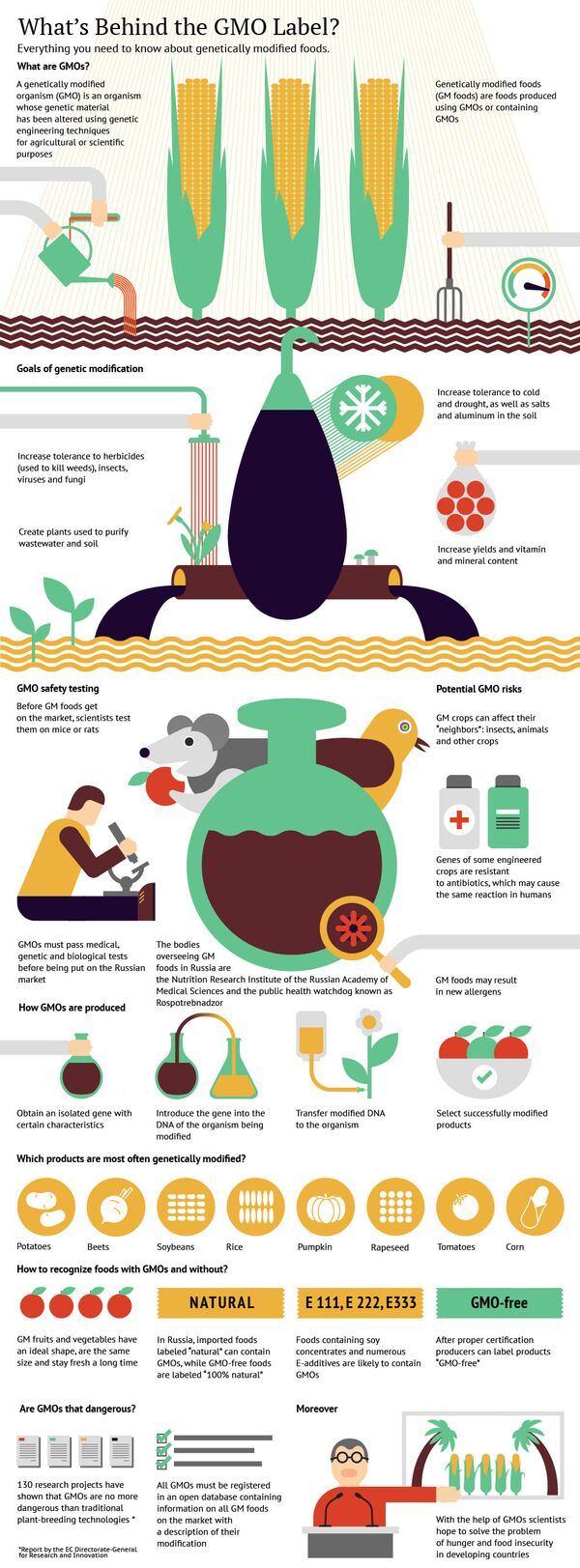"All the studies that have been done so far indicate that any increase in food prices [due to GMO labeling], if it occurs at all, will be very minimal," Andrea Stander of Rural Vermont told Sputnik. "There is a far greater risk of a devastating impact on food prices if one of the genetically engineered […] mono-crops fall victim to a pest or disease or simply the effects of climate change."
Falko Schilling, a consumer protection advocate with the Vermont Public Interest Research Group told Sputnik news agency that consumers will not notice any effect on end products due to GMO labeling.
"Research shows that consumers are not likely to see any major price increases from state based labeling laws," Schilling said.
Shortly after the governor of Vermont signed a bill requiring GMO labels on food products, the Grocery Manufacturers Association filed a lawsuit against the state. The first hearing is scheduled for January 7, 2015.
"The corporations that sued the state of Vermont do not want to see a state-based labeling requirement for a number of reasons. One reason that is often stated is that they believe if they had to label their products as being 'produced with genetic engineering' that consumers would no longer buy their products," Schilling said.
The consumer protection advocate said, "There have also been corporations that claim Vermont's law goes against their constitutional right to keep this information from the public."
Stander observed that GMO labeling will not serve the corporate good of multinationals despite the apparent common good.
"They [corporations] believe the law will not serve the corporate good — which, in my opinion, is to maintain corporate control of our food system rather than giving consumers what they want," Stander said.
As to losses that manufacturers may suffer as a result of mandatory GMO labeling, Schilling cited the example of Vermont-based ice-cream producer Ben & Jerry's.
"Anecdotally, we have heard from our partners at Ben & Jerry's that when they made the decision to source non-genetically engineered ingredients, they were able to do so without having to raise the cost of a pint of ice cream," Schilling said.
Both activists emphasized that the United States is lagging behind the rest of the world in providing customers with information on genetically modified food.
"America is behind the curve in terms of the rest of the world on labeling GMOs. In recent polls over 90% of Americans want to see GE foods labeled because they are concerned about potential threats to their health, the health of their children and the health of our environment," Stander from Rural Vermont stressed.
Unilever, one of the world largest food and beverages producer, declined to provide any comments to Sputnik, while a Starbucks spokesperson said that their company is not part of the lawsuit against GMO labeling in the United States and they have not taken a position on the issue.
Currently three US states, Maine, Connecticut and Vermont, have passed GMO labeling laws. But unlike Maine and Connecticut's GMO food labeling laws which are dependent on other neighboring states first passing their own laws, Vermont's law is the only one that is independent and is supposed to go into effect on July 1, 2016 regardless of neighboring states actions.
According to the US Food and Drug Administration, it is currently the food manufacturers choice to indicate that their products Incorporate genetic engineering methods.






